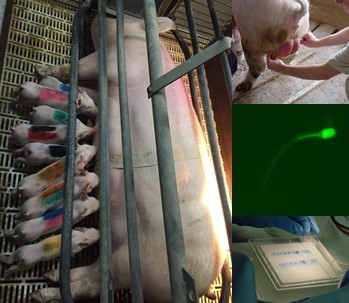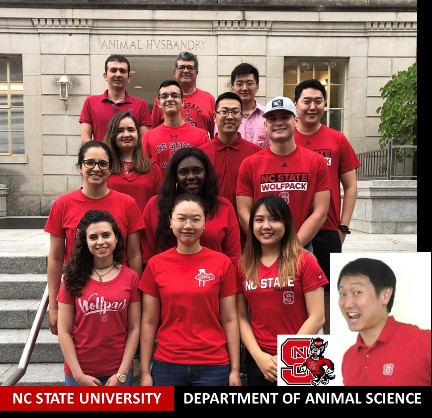Research Faculty
Fellner Lab Experience
ASSURE students can assist with ongoing research or initiate short-term independent exploratory experiments. Our lab focuses on the dynamics of microbial fermentation and impact of gut metabolites on rumen function and animal performance. Students will gain experience in in vivo and in vitro techniques, chromatography, toxicology and enzymology. They will be encouraged to explain their results with practical application.
Flowers Lab Experience 
ASSURE students will have the opportunity to assist with studies that examine how the neonatal environment of both male and female piglets affects their adult reproductive performance. They will get to assist with the birth of piglets and learn how to properly obtain a variety of biological samples from swine of all ages. Computer-assisted semen analyses, immunocytochemistry, and gel electrophoresis are several of the laboratory procedures that they can learn.
Jiang Lab Experience
ASSURE students will participate in a research program which is centered on developing statistical methods and software for understanding the genetic basis of complex traits. Training encompasses basic statistics, programming, Mendelian and population genetics, genetic association analysis, and genomic prediction of breeding values in livestock and polygenic risk scores in humans.
Kim Lab Experience
ASSURE students can participate research activities in the area of intestinal health and growth interaction in nursery pigs. These research projects are mostly led by graduate students and closely related to industry application. Students will have opportunities to learn about nutritional and immunological measurements using gut epithelium of nursery pigs, research ideation with graduate students, and possible interactions with industry leaders who fund the research projects.
Knauer Lab Experience
ASSURE undergraduate students will join an applied, swine production research program. Dr. Knauer is a NC State Swine Extension Specialist. Therefore he works with NC swine farmers to conduct applied research and deliver education programs. Dr. Knauer’s swine research program is largely hands on, collecting data at the NCDA Tidewater Research Station or collaborating with commercial pig farms. Collected data is then evaluated using modern data analytics.
Leonard Lab Experience
Students joining Dr. Leonard’s lab will partake in applied research projects using technology and data to improve swine production and welfare. Students will visit commercial swine facilities to install sensors and collect data related to environmental conditions, housing parameters, and swine behavior. During their summer research project, students will receive hands-on training with technologies such as data loggers, computer vision systems using thermal or depth cameras, a 3D printer, and data processing software.
Pickworth Lab Experience
ASSURE students will be able to join a variety of research opportunities related to ruminant management and nutrition to educating the next generation of animal science students. Students may have the opportunity to engage in data collection in the field with the animals (beef cattle or sheep) or learn laboratory analysis techniques (hormone assays or feed analysis). ASSURE students may even be able to translate their experiences into teaching engagements with high-school youth while meeting with food-animal industry leaders.
Poole Lab Experience
Dr. Poole’s current research explores how environmental and management practices such as endophyte-infected fescue and heat stress impact growth and reproductive performance in beef cattle. Infertility and/or fertility-related deficiencies in livestock species, such as those caused by these factors, are a major source of economic loss for producers. While the characteristics of the fescue toxicosis syndrome have been extensively studied in an attempt to find remedies for, or offset the symptoms of this syndrome, its complex etiology has hindered an exploration of specific mechanisms of action of ergovaline on specific tissues. Therefore, the potential exists to address and improve reproductive issues in today’s cattle industry through innovative research combining basic and applied experimental models.
Odle Lab Experience
ASSURE students can assist with USDA-funded research exploring mechanisms by which nutrients enhance repair of suckling pigs’ injured intestines. Students will learn about precision nutrition during early life stages, surgical ischemia, reperfusion injury and repair mechanisms with Ussing chambers and advanced immunohistochemistry.
van Heugten Lab Experience
ASSURE students will be actively involved in an applied swine nutrition research and extension program, focusing on nutritional strategies to improve the productivity and sustainability of pork production. Current research efforts include the evaluation of nutritional approaches for heat abatement in sows, essential fatty acid requirements of sows, impact of lipid composition and quality on swine health and productivity, the novel use of enzymes to improve health and pig performance, and the evaluation of the value of feed additives to promote health in nursery pigs in the absence of growth-promoting antibiotics. ASSURE students will have the opportunity to experience feeding and management of pigs, tissue sampling, data collection and management, and writing of reports.
Wang Lab Experience
Assure students will be exposed to projects related to synchronous uterine and conceptus development in pigs as well as age-associated uterine adaptability to pregnancy in mice and human cell lines. One of our long-term goals is to understand the fundamental roles of conceptus- and uterine-secreted factors that govern synchronous uterine and conceptus development required for implantation, the establishment of pregnancy, and placental development required for fetal growth and survival. We aim to develop new strategies to optimize placental and fetal growth that will improve the overall health and survivability of piglets before and after birth to reduce neonatal death losses. Furthermore, we have identified that aging compromised the ability of uterus to undergo decidualization instead of implantation. Thus, another long-term goal of ours is to investigate the molecular mechanisms that underlie the age-associated uterine adaptability to pregnancy using mice and human cell lines.
Ward Lab Experience
ASSURE students working with Dr. Ward’s Dairy Management lab will gain applied research experience in dairy nutrition, milk quality, and precision dairy management. Dr. Ward has ongoing projects focused on using automation and precision technology to help farmers make data driven decisions. Specific research areas include: 1. Developing best management practices for automated calf feeding systems, 2. Using milk quality and component data as a diagnostic tool on the farm, and 3. Precision feeding for improved production efficiency. In addition to projects ongoing at our research farms, students will also work directly with commercial farms to collect data and test technologies.
Weaver Lab Experience
The Weaver Lab focuses on applied research related to small ruminant production in the southeastern United States. This research involves utilization of genetic tools, nutrition, and management techniques to improve parasite resistance, animal performance, and end-product quality and value. Student experiences included animal handling and sample collection, blood analysis, parasitology techniques, forage evaluation, and data management/analysis.
Xi Lab Experience
ASSURE Students will participate in our project that is primarily focused on the regulatory mechanism of key enzymes in controlling fatty acid metabolism and utilization. The role of fatty acid as energy and prebiotics in development of neonatal pigs will be explored in this project using cell and organoid culture system as models. Students will have opportunities to learn advanced technologies in cell cultures and biological analyses such as cell (organoid) isolation, mRNA extraction, RT-PCR preparation, GC and GC/MS operation, liquid scintillation counting and enzymatic assays.